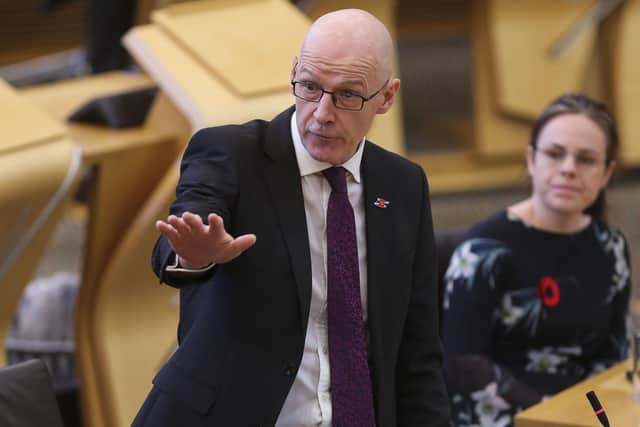Covid Scotland: Passport scheme’s ‘core purpose’ to was increase vaccination rate says John Swinney
The Deputy First Minister made the comment as he refused to say which parts of the hospitality and leisure sector the scheme could apply to if it is extended.
Speaking on BBC Radio Scotland’s Good Morning Scotland programme, he said: “The core purpose of applying the vaccination certification scheme in the first place was to increase take-up of the vaccine.”
Advertisement
Hide AdAdvertisement
Hide AdMr Swinney argued that this has been achieved, saying: “In September, 53 per cent of 18 to 29-year-olds were vaccinated; by November 1 that had risen to 68 per cent.
“That’s a significant impact of the Covid certification scheme.”
His comments came after opposition politicians and business leaders reacted angrily to the proposal to extend the scheme, which requires people to prove they have had two Covid vaccines before they can enter nightclubs and some large events.
Liz Cameron, chief executive of the Scottish Chambers of Commerce, said such a move would be a “massive step backwards”, while Leon Thompson, of industry body UKHospitality, said it would be “extremely alarming to hospitality businesses welcoming customers to their Covid-safe venues”.
Mr Swinney however insisted that no decisions have yet been taken, arguing instead that ministers are simply being open that it is a possibility.


The Government is “signalling that, given the situation around the pandemic and the serious situation that we currently face, and are likely to face for the foreseeable future over winter, we have to be ready to take additional measures”, he said.
The Deputy First Minister added: “I’m not signalling we’re going to do that, I am simply saying that we’re considering it. It is about being open with the Parliament and the public.”
Asked which parts of hospitality and leisure it could be applied to, Mr Swinney said: “We’ve not made any decisions.
Advertisement
Hide AdAdvertisement
Hide Ad“The reason we’ve not made any decisions is that Government has got to be satisfied any decisions it takes are proportionate in the context of the state of the pandemic – that is the legal test we are obliged to follow.
“The Government is going through a process of considering what it needs to do in the context of the current prevalence of the virus.”
He continued: “It’s not a case of we have taken a decision and not announced it; we have taken no decisions, we are airing the fact we have got a significant challenge, we need to engage with the business community and engage with sectors about how we best address that.
“And we will take decisions in the light of that consultation and in the light of the prevalence of the pandemic at that stage.”
Scotland’s vaccine passport scheme was introduced at the start of October and applies to nightclubs, unseated indoor events with more than 500 people, unseated outdoor events with more than 4,000 people, and any event where more than 10,000 people are present.
But with fears that infections could spike again from the current “concerningly high level”, Mr Swinney told MSPs at Holyrood on Tuesday that the country is in a “precarious and unpredictable” situation.
A message from the Editor:Thank you for reading this article. We're more reliant on your support than ever as the shift in consumer habits brought about by coronavirus impacts our advertisers.
If you haven't already, please consider supporting our trusted, fact-checked journalism by taking out a digital subscription.
Comments
Want to join the conversation? Please or to comment on this article.
